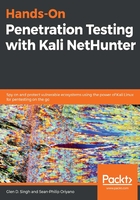
上QQ阅读APP看书,第一时间看更新
OWASP testing framework
The Open Web Application Security Project (OWASP) testing framework is defined as a low-level penetrating-testing guide for common web application and security services issues. It was developed as a best-practice penetration-testing framework for anyone to implement within their organization.
The OWASP Testing Guide v4 can be found at https://www.owasp.org/index.php/OWASP_Testing_Project.
The OWASP Testing Framework outlines five phases:
- Phase 1: Before Development Begins
- Define a System Development Life Cycle (SDLC)
- Review Policies
- Developing Measurement and Metrics Criteria and Ensuring the trace
- Phase 2: During Definition and Design
- Review the Security Requirements
- Review the Design and Architecture
- Creat and Review UML Models
- Create and Review Threat Models
- Phase 3: During Development
- Code Walkthrough
- Code Reviews
- Phase 4: During Deployment
- Application Penetration Testing
- Configuration-management Testing
- Phase 5: Maintenance and Operations
- Conduct Operational Management Reviews
- Conduct Periodic Health Checks
- Ensure Change-verification
For more information the OWASP Testing Framework, please visit https://www.owasp.org/index.php/The_OWASP_Testing_Framework.
Furthermore, OWASP has been continuously engaged in providing web security awareness globallly and methods on improving web security. Their OWASP Top 10 is a list of the most critical security risks in web applications.
The following is the OWASP Top 10 – 2017 list of critical security risks to web applications:
- A1:2017-Injection
- A2:2017-Broken Authentication
- A3:2017-Sensitive Data Exposure
- A4:2017-XML External Entities (XXE)
- A5:2017-Broken Access Control
- A6:2017-Security Misconfiguration
- A7:2017-Cross-Site Scripting (XSS)
- A8:2017-Insecure Deserialization
- A9:2017-Using Components with Known Vulnerabilities
- A10:2017-Insufficient Logging & Monitoring
Further details about each category of the OWASP Top 10 – 2017 list can be found at https://www.owasp.org/index.php/Top_10-2017_Top_10.